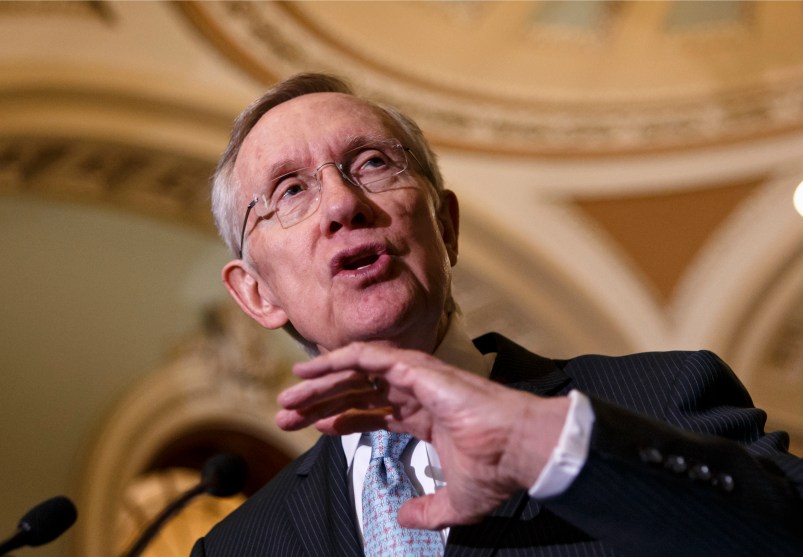Senate Majority Leader Harry Reid on Tuesday threatened to “go nuclear” on filibuster reform in his strongest terms yet, one day after Republicans completed a triple-filibuster of President Barack Obama’s most high-profile judicial nominees.
“I’m considering looking at the rules,” said the Nevada Democrat. “All this [talk of the] sacred nature of the filibuster — I think what we need, and the American people want, is to get things done around here. I’m not talking about changing anything dealing with the Supreme Court or dealing with basic legislation. I am talking about executive nominations.”
“I’m at the point where we need to do something to allow government to function,” he said. “The obstruction we’ve seen in the last five years is nothing like we’ve ever seen before. … This is not how democracy is supposed to work, or function, and the American people are sick of this.”
An aide to the majority leader told TPM that “Reid’s keeping the whip count in his head and talking with each of his colleagues directly. When he feels ready, he’ll do it. Could be soon.”
Reid’s remarks reflect the growing support among Democratic senators for eliminating the minority party’s ability to block an up-or-down vote on judges. It comes after Republicans filibustered nominees Patricia Millett, Nina Pillard and Robert Wilkins to the D.C. Circuit Court of Appeals, arguably the country’s second most powerful court, which looms large in Obama’s second term as it tends to have the final say on matters of executive authority. It was an unprecedented move by the GOP as they did not take issue with the nominees’ qualifications; they merely said the vacancies should not be filled.
Sen. Dianne Feinstein (D-CA), who has not supported filibuster reform in the past, said the GOP’s mass blockade of D.C. Circuit nominees has changed her mind.
“I do now [support a rules change],” she said in response to TPM’s question. “It is unconscionable for a president not to be able to have his cabinet team, his sub-cabinet team and not be able to appoint judges. I’ve been very shocked by the way very qualified nominees, particularly for the D.C. Circuit, have been filibustered”
Sen. Jeff Merkley (D-OR), perhaps the most outspoken proponent of filibuster reform, said Feinstein’s change of position was “very significant” and is the result of a “really tremendous abuse of the process by the minority.” The GOP’s blockade of top Obama judges, he said, “is completely unacceptable and it has changed the dynamic among the Democratic caucus.”
Sen. Barbara Boxer (D-CA) told TPM she’s “very open” to a rules change. “I think any president, Democratic or Republican, deserves to have a team in place,” she said. And I really think that when you don’t appoint judges, justice delayed is justice denied.”
Boxer has been cited by pro-reform advocates inside and outside the Senate as resistant to filibuster changes, out of concern that a future Republican president and majority may use it to appoint anti-abortion judges or weaken reproductive rights laws. “So I am open to a rules change, which is a real change for me,” she said. “I am open to looking at a change in the rules for nominees and most judges.”
Sen. Carl Levin (MI), a consistent Democratic opponent of filibuster reform, said the GOP’s recent judicial blockade hasn’t changed his mind. “If the majority can change the rules, there are no rules,” he told reporters.
Reid declined to say Tuesday if he had the 50 votes necessary to pull the nuclear trigger.
He ruled out an agreement to adjust the size of the court or confirm just one or two nominees to it. “I insist on getting all three of these qualified [nominees],” he said. “Look at their educational background. Look at their experience in the law. Look at their moral integrity. So, no. Why should we agree to something less than the law of our country?”
Sen. John McCain (R-AZ), who earlier this summer struck a deal to confirm executive branch nominees and defuse the nuclear option standoff, signaled no plans for a repeat.
“I don’t know. I don’t know,” he told reporters Tuesday. “If I were the Democrats I’d be a little cautious because Republicans will be in the majority someday … And if you break the rules by just a 51-vote margin, you are then breaking all the rules of the Senate.”
Does McCain believe Democrats will go nuclear this time? “I hope not.”






